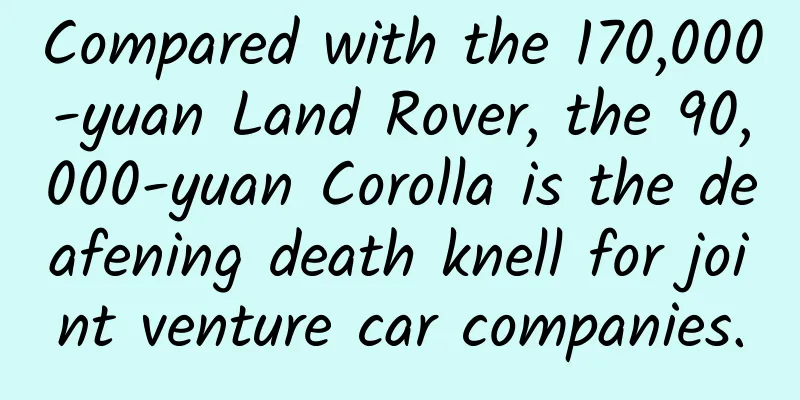Cadillac's second-tier luxury car sales are far ahead, and the competition for the second place is becoming more and more intense

|
Tariff adjustments are changing the current competitive landscape in the second-tier luxury car market. In July, Lexus won the monthly sales crown among second-tier luxury cars, and even took the second place with cumulative sales of more than 80,000 vehicles in the first seven months. Jaguar Land Rover, which fell to third place, is likely to be overtaken by Volvo. Among the four second-tier luxury brands, Cadillac still maintained rapid growth and continued to top the list with cumulative sales of more than 120,000 vehicles. According to data released by SAIC-GM, Cadillac sold 14,300 vehicles in China in July, a year-on-year increase of 19.1%. From January to July, its cumulative sales have reached 126,625 vehicles, a year-on-year increase of 36.4%. So far, Cadillac has achieved 63.3% of its annual sales target of 200,000 vehicles. In July, Lexus shook off the gloom of the previous two months and saw a sharp rebound, with sales increasing by 37.5% year-on-year to 15,201 units. Not only did it win the monthly sales crown in the second-tier luxury car market, it also drove the cumulative sales in the first seven months to 83,927 units, a year-on-year increase of 17.6%. It also surpassed Jaguar Land Rover for the second time this year and once again won the "second place". Wang Cun, director of the Imported Car Committee of the China Automobile Dealers Association, said that among the top ten imported car brands in the first half of the year, except for Lexus and Volvo, the rest of the brands have declined. "Lexus and Volvo have grown in the first half of the year, and overall, inventory control is relatively good." Lexus sold 6,173 vehicles in China in July, down 46.9% year-on-year and 43.2% month-on-month; its cumulative sales in the first seven months were 77,837 vehicles, only 6,236 vehicles away from Volvo, which ranked fourth. Unfavorable external factors have put Jaguar Land Rover dealers under tremendous pressure. Recently, media reports said that many Jaguar Land Rover dealers in Beijing have collectively stopped delivering cars from the manufacturer and only sell new cars in stock because they are dissatisfied with the manufacturer's policy pressure and the long-term impact of price wars. Volvo still showed a relatively stable growth trend; from the perspective of its sales in the first seven months, it basically maintained a monthly sales level of 10,000 vehicles. Data showed that Volvo sold 10,121 vehicles in China in July, a year-on-year increase of 9.2%; from January to July, its cumulative sales were 71,601 vehicles, a year-on-year increase of 17%. As for the impact of tariff adjustments, Chen Lizhe, president of Volvo Car Group Greater China Sales Company, once said, "Currently imported cars account for between 10% and 20%," and "Volvo's current strategy is still mainly to gradually base it on domestic production." As a winner of Toutiao's Qingyun Plan and Baijiahao's Bai+ Plan, the 2019 Baidu Digital Author of the Year, the Baijiahao's Most Popular Author in the Technology Field, the 2019 Sogou Technology and Culture Author, and the 2021 Baijiahao Quarterly Influential Creator, he has won many awards, including the 2013 Sohu Best Industry Media Person, the 2015 China New Media Entrepreneurship Competition Beijing Third Place, the 2015 Guangmang Experience Award, the 2015 China New Media Entrepreneurship Competition Finals Third Place, and the 2018 Baidu Dynamic Annual Powerful Celebrity. |
Recommend
What is DSP advertising? What are the operating techniques for DSP delivery?
1. What is DSP advertising ? DSP (demand-side pla...
A refreshing welfare fighting game on PS4 "Guilty Gear Unknown Dimension - Omen -" shy experience
After much anticipation, the second wave of Chine...
For the first time in history! Audi voluntarily admits monopoly: willing to be punished
The Economic Information Daily reporter learned o...
How to attract traffic and promote on Weibo? The most effective method of attracting traffic on Weibo, easily attracting 500+ precise fans per day
At present, Weibo still has more than 100 million...
The CPU is not enough? Why do Android flagships get so hot when playing games?
The heating of mobile phones is definitely a heada...
Manufacturers face difficulties, but the domestic smartphone market is far from saturated
It is obvious that domestic smartphone manufactur...
iOS15.1.1 official version: It turns out that the poor signal is not our fault
iOS 15.1.1 push: fix call disconnection At presen...
Information flow advertising, what is the effect of such provocative creativity?
Eyeball economy, an advertisement that can attrac...
Not all sharks are so vicious!
Key Points ★ Even great white sharks don’t like t...
Title creation method: How to choose a title for a recommendation channel?
Regarding the skills of choosing titles , I think...
When you wake up, your sleep report is "automatically generated"? Smart pajamas are coming!
Compiled by: Gong Zixin Sleep is an important par...
Tencent's ride-hailing code launches two new features: finally you can stay in bed a little longer
On June 3, Tencent's ride-hailing code launch...
"Ask about suicide again" has blossomed! It's better to make money from it than to seek happiness from it
In this age of advanced internet, we can ask any ...
Don’t take good photos? Try to “think” from the perspective of the camera…
Every autumn, when I see the golden ginkgo leaves...









